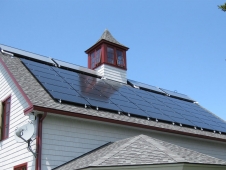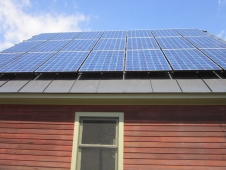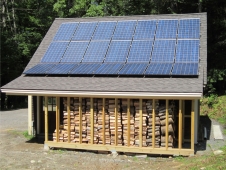Federal Investment Tax Credit (ITC)
Residential
Qualifying Systems: Solar PV, Solar Hot Water, Geothermal, and Battery Energy Storage*
Maximum Credit: None
Where/ who/ when: This credit is taken on your personal income tax return. You must have taxable income to take the credit.
Expiration Date: 12/31/2023 – please see phase out schedule below:
- 30% for systems placed in service by 12/31/2019
- 26% for systems placed in service after 12/31/2019 and before 01/01/2023
- 22% for systems placed in service after 12/31/2022 and before 01/01/2024
- There is no maximum credit for systems placed in service after 2008.
- Systems must be placed in service on or after January 1, 2006, and on or before December 31, 2023.
- The home served by the system does not have to be the taxpayer’s principal residence.
Specific to Solar Hot Water:
- At least half the energy used to heat the dwelling’s water must be from solar in order for the solar water-heating property expenditures to be eligible.
- Equipment must be certified for performance by the Solar Rating Certification Corporation (SRCC) or a comparable entity endorsed by the government of the state in which the property is installed.
- The tax credit does not apply to solar water-heating property for swimming pools or hot tubs.
*Battery Energy Storage
The federal tax code does not explicitly reference energy storage, so stand-alone energy storage systems do not qualify for the tax credit. However, the IRS issued Private Letter Rulings in 2013 and 2018, which address energy storage paired with PV systems. In both cases, the IRS ruled that the energy storage equipment when paired with PV met the statutory definition of a “qualified solar electric property expenditure,” as was eligible for the tax credit. It is important to note that Private Letter Rulings only apply to the taxpayer who requested it, and do not establish precedent. Any taxpayer considering the purchase of an energy storage system should consult their accountant or other tax professional before claiming a tax credit.
Source:
http://programs.dsireusa.org/system/program/detail/1235
Commercial
Qualifying Systems: Solar PV, Solar Hot Water, Geothermal, and *Battery Energy Storage
Maximum Credit: None
Where/ who/ when: This credit is taken on your business tax return. You must have taxable income to take the credit.
Expiration Date: None at this time – please see phase out schedule below:
- 30% tax credit for projects commencing construction between January 1, 2006, and December 31, 2019, but placed in service before 2024.
- 26% tax credit for projects commencing construction between January 1, 2020, and December 31, 2022, but placed in service before 2026.
- 22% tax credit for projects commencing construction between January 1, 2023, and December 31, 2023, but placed in service before 2026.
- 10% tax credit for projects commencing construction after December 31, 2023, or placed in service after December 31, 2025.
Specific to Solar Hot Water:
- The tax credit does not apply for solar water heating for swimming pools or hot tubs.
- At least half of the energy used to heat the water must be from solar.
*Battery Energy Storage
The federal tax code does not explicitly reference energy storage, so stand-alone energy storage systems do not qualify for the tax credit. However, the IRS issued Private Letter Rulings in 2013 and 2018, which address energy storage paired with PV systems. In both cases, the IRS ruled that the energy storage equipment when paired with PV met the statutory definition of a “qualified solar electric property expenditure,” as was eligible for the tax credit. It is important to note that Private Letter Rulings only apply to the taxpayer who requested it, and do not establish precedent. Any taxpayer considering the purchase of an energy storage system should consult their accountant or other tax professional before claiming a tax credit.
Source:
http://programs.dsireusa.org/system/program/detail/1235
USDA RURAL DEVELOPMENT PROGRAM (REAP)
The Rural Energy for America Program (REAP) provides assistance to agricultural producers and rural small businesses to complete a variety of projects. Offering both loan guarantees and grants, the REAP program helps eligible applicants install renewable energy systems such as solar panels, anaerobic digesters, make energy efficiency improvements such as installing irrigation pumps or replacing ventilation systems and conduct energy audits and feasibility studies.




